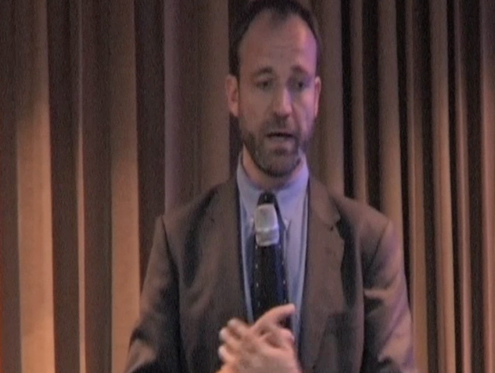The Norwegian government has defended a controversial peace initiative that will channel aid into conflict-affected regions in Burma despite mounting criticism that it risks coercing ethnic and civil society groups into joining the government.
Deputy Foreign Secretary Torgeir Larsen addressed a crowd of activists and NGOs in Chiang Mai yesterday in an effort to downplay concerns that the multi-million dollar scheme could upset the fragile peace process in eastern Burma.
“Moving from ceasefire to real peace is what we are aiming at,” said Larsen. “It’s a delicate and long-term process and this is the first phase. It’s about testing out the way.”
The Norwegian delegation returned this week from a mission to Kyaukgyi in Karen state, where they met with the commanders of the Burmese army, representatives from the Karen National Union (KNU) and community leaders for internally displaced persons (IDPs) to discuss plans for the $66 million dollar project.
But the scheme, which aims to rebuild the border regions and facilitate the resettlement of IDPs and refugees in Karen and Shan states, has been criticised as premature and insensitive to political challenges.
“It must not be used to replace political dialogue, it must not be used to coerce armed groups into ceasefires,” insisted Charles Petrie, who is heading the initiative. “Progress needs to be well advanced in order for groups to ask for us to help them test the validity of the [ceasefire] agreement.”
However, critics worry that the initiative is being presented as “bait” for ethnic groups to join the government under the 2008 constitution. The Burmese government has insisted that the project should commence before June 2012 ostensibly ahead of the rainy season. But this also coincides with the United Nationalities Federal Council’s (UNFC) 10 June deadline for the Burmese military to resolve the Kachin conflict.
“It is now clear to me that the intention of the plan is to back the Burma government to bring the ethnic groups under the 2008 constitution and not support the UNFC or KIO requests to have dialogue outside of parliament,” a source from a local humanitarian group, told DVB on the condition of anonymity.
The new initiative follows the Norwegian government’s announcement to suspend humanitarian aid to cross border groups. This decision has left humanitarian groups, including Norwegian Church Aid, which funds the Mae Tao clinic in Mae Sot, dismayed and in financial dire straits. DVB has previously reported on an escalating malnutrition crisis along the border as funding dries out.
“We have signalled that for quite some time that we will be phasing down [cross border aid] while scaling up our activities inside,” said Petrie. “It’s connected to the opportunities to do more on the inside.”
Despite the cuts, Larsen insisted that it would be “irresponsible” to encourage refugees or IDPs to return home at this early stage.
The peace initiative has been further censured for channelling all aid money through government-sanctioned NGOs operating out of Rangoon, which campaigners say risks marginalising key voices.
Petrie insisted there were new opportunities to operate openly inside Burma rather than “in the dark”. However, many human rights groups insist it is far too early to move back into Burma as legal entities. This policy, they say, could have the effect of coercing exiled groups into registering as official NGOs in Burma to access funding.
This week’s mission officially confirmed the KNU-led Committee of Internally Displaced Karen People (CIDPK) would be the primary vehicle through which funds would be channelled. The CIDPK is being led by Padoh Htoo Htoo Lay, who accompanied the Norwegian delegation to Burma this week.
When pressed, Petrie admitted that KNU General-Secretary Zipporah Sein had not been informed about the exact nature of their mission. Zipporah Sein has previously told DVB that while the group accepted the pilot stage of the initiative (carried out in Karen state), it did not want it to be expanded before a political settlement was reached.
The general secretary of the Women’s League of Burma, Tin Tin Nyo, further slated the lack of women involved in the process. “[Gender] inclusiveness is not really mentioned in the paper. If they are not considered, then how can you really support peace in our country?”



